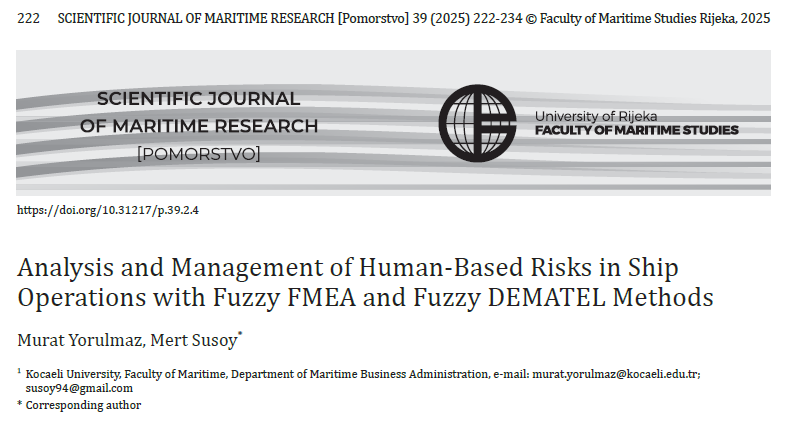Analysis and Management of Human-Based Risks in Ship Operations with Fuzzy FMEA and Fuzzy DEMATEL Methods
Keywords:
Ship operations, Risk analysis, FMEA, DEMATEL, Fuzzy logicAbstract
The operations carried out on ships, which bear most of the world trade load and constitute the fundamental element of maritime commerce, involve many risks. In today’s context, the concept of risk has evolved into the assessment of risk, and various methods have been developed to reduce or eliminate risks. In this perspective, the objective of the study is to identify and assess human errors, a major risk factor in accidents occurring in ship operations, through an integrated fuzzy
approach, and manage them accordingly. By emphasizing the inherent risk in the nature of the human factor in maritime operations, this study makes a noteworthy contribution to maritime literature by identifying human-based risk factors using Fuzzy FMEA and Fuzzy DEMATEL methods. Although FMEA and DEMATEL methods are widely used in risk assessment in literature, there are limited number of research integrating Fuzzy Logic into these methods. Therefore, this study holds
importance in presenting human-based risk factors through two different methods and highlighting the impact of the human factor in ship operations, which inherently involve risks.

Downloads
Published
Issue
Section
Categories
License
Copyright (c) 2025 Mert Susoy, Murat Yorulmaz

This work is licensed under a Creative Commons Attribution-NonCommercial-NoDerivatives 4.0 International License.
Scientific Journal of Maritime Research understands the need for authors to disseminate and maximize the impact of their research. When submitting an article for publishing in Scientific Journal of Maritime Research, it implies that the Corresponding Author transfers, with the consent of all Coauthors, the copyright ownership in the referenced submission, including all versions in any format now known or hereafter developed, to the Scientific Journal of Maritime Research.
Copyright protects your original work and research material and prevents others from using it without your permission. Others will be required to credit you and your work properly, thus increasing its impact. Should your submission be rejected or withdrawn prior to acceptance for publication by Scientific Journal of Maritime Research, this transfer will be null and void.
Authors, users or readers of an article need clear instructions on how they can use the article. Scientific Journal of Maritime Research uses the Creative Commons Attribution-NonCommercial-NoDerivatives (CC-BY-NC-ND) 4.0 International License, which governs the use, publishing and distribution of articles by authors, publishers and the wider general public.
The authors are allowed to post a digital file of the published article, or the link to the published article (Scientific Journal of Maritime Research web page) may be made publicly available on websites or repositories, such as the Author’s personal website, preprint servers, university networks or primary employer’s institutional websites, third party institutional or subject-based repositories, and conference websites that feature presentations by the Author(s) based on the published article, under the condition that the article is posted in its unaltered Scientific Journal of Maritime Research form, exclusively for non-commercial purposes.




